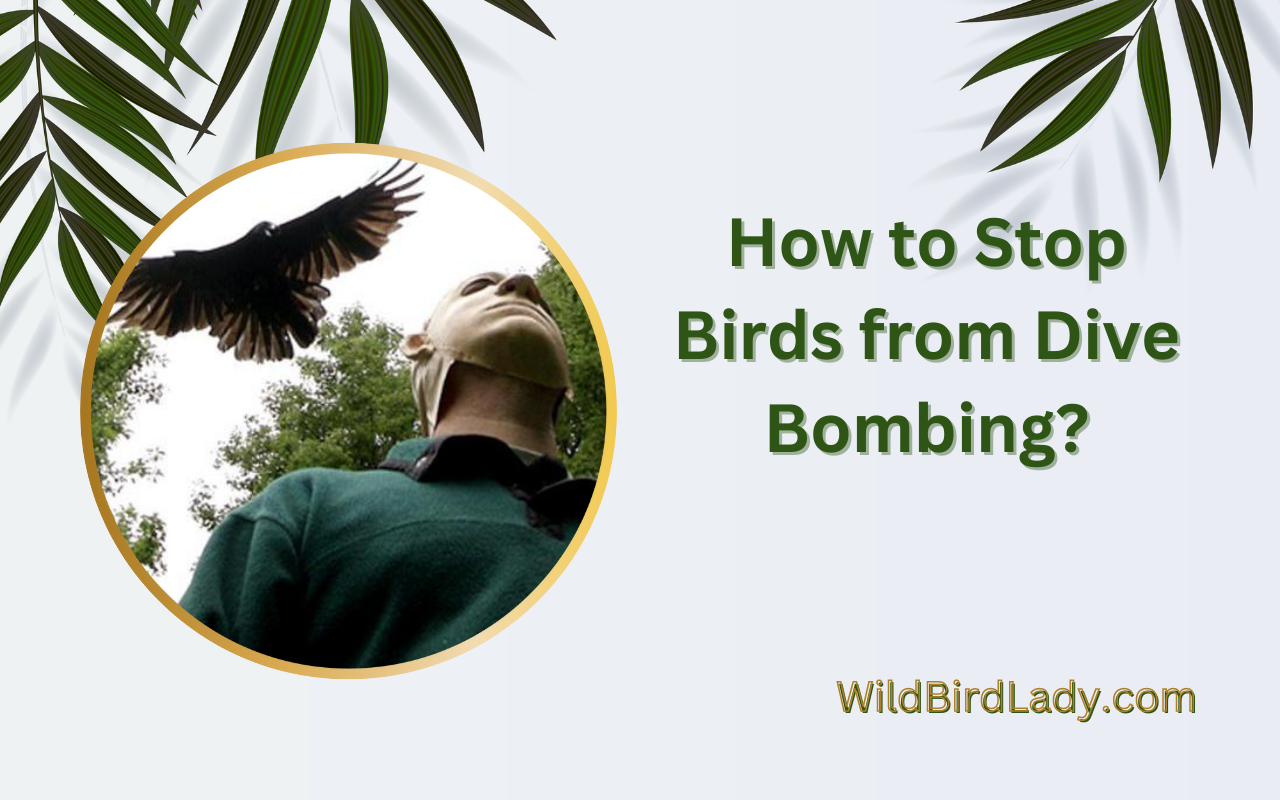Ah, the great outdoors! The fresh air, the stunning views, the adrenaline-inducing aerial attacks from winged creatures determined to turn your serene stroll into a Hitchcockian nightmare.
Yes, dear reader, we’re talking about those fearless dive-bombing birds who seem to have a personal vendetta against your head. But fear not!
In this article, we’ll unveil some clever tips and tricks to outsmart our feathered foes and restore peace to your walks in the park.
So put on your bird-repellent helmet and let’s dive in!
What is Birds Dive Bombing
Birds are a beautiful and essential part of our environment, providing us with countless benefits such as pollination and pest control. However, when these feathered creatures become too aggressive, they can pose a threat to humans and animals alike. One such behavior that can be a nuisance or even dangerous is dive bombing.
This is when birds repeatedly swoop down at someone or something, sometimes causing physical harm. Dive bombing is most commonly seen during nesting season when birds are fiercely protective of their young ones or territory.
It can also be triggered by certain environmental factors such as extreme heat or drought conditions. Whatever the reason for the behavior, it’s essential to find a solution to prevent injuries to humans and animals.
The potential dangers of bird dive bombing cannot be overlooked. For example, if you’re driving a vehicle and a bird hits your windshield or gets caught in your car’s engine while dive bombing, it could cause an accident on the road.
In some cases, people may suffer cuts and bruises from being hit by birds’ sharp talons while walking outside. Moreover, pet owners need to be wary of their furry friends being attacked by birds while playing in the backyard.
It’s crucial to take action before someone gets hurt due to this aggressive behavior of birds.
The Importance of Finding A Solution
Finding ways to stop birds from dive bombing is not only important for our own safety but also for the well-being of these magnificent creatures themselves. While it might seem like aggression towards humans is unnecessary on their part, in reality it serves several purposes such as protecting their young ones from predators.
By understanding why birds exhibit such behavior we can take steps that discourage them from doing so without causing any harm to them. Additionally, preventing these attacks can help reduce the number of bird fatalities caused by accidents involving cars and other hazards.
It’s crucial to find a humane solution that will allow us to coexist peacefully with these feathered creatures rather than resorting to extreme measures such as extermination. With that in mind, let’s explore some effective and safe ways of preventing bird dive bombing.
Understanding the Behavior of Birds
The Reason Behind Bird Dive Bombing
Birds, the guardians of their territory, can turn a leisurely walk into a surprise aerial assault. Whether it’s protecting their young or defending their feeding grounds, these feisty creatures have developed the art of dive bombing as a formidable defense mechanism.
With a little awareness and caution, you can reclaim your peaceful walks amidst our avian protectors.
The Influence of Weather Conditions on Bird Behavior
Strong winds or rainfall can make it difficult for birds to fly or hunt for food. As a result, they may become irritable and aggressive towards anything that comes too close.
Similarly, during times when temperatures are high or humidity levels are low birds tend to be more active during early morning hours when it’s cool and less windy.
On the other hand, birds tend not to fly much during midday because the heat makes it uncomfortable for them.
The Impact Time of Day Has on Bird Behavior
Bird behavior varies based on the time of day. Some birds, known as diurnal species, are active during daylight hours and are easily startled by sudden movement or noise. They prefer open spaces to ensure a quick takeoff if needed.
On the other hand, nocturnal birds rely on their sense of hearing, are less aggressive towards humans, and are often found in areas with trees or structures for shelter.
Understanding these behaviors, along with the influence of weather conditions, can aid in developing effective strategies to prevent bird dive bombing.
Prevention Techniques
Bird dive bombing can be a significant nuisance, and sometimes even dangerous. Although it is not possible to eliminate birds entirely, preventing them from perching or nesting in specific areas can help reduce the likelihood of them dive-bombing people. There are several techniques one can use to prevent birds from nesting in particular areas.
Bird Netting
One effective way of preventing birds from diving on people is by using bird netting. Bird netting provides an effective barrier that prevents birds from getting close to certain areas.
It is especially useful if you have an area that needs protection but cannot be physically altered in any way, such as a statue or outdoor seating area. To install bird netting, start by measuring the area you want to cover.
Cut the bird netting to size with a pair of scissors and fasten it securely with cable ties or clips around the perimeter of the target area. Be sure to leave enough slack so that it hangs down between 6-12 inches below its attachment point; this creates a physical barrier between birds and their target.
Decoys and Scare Devices
Another technique that has been proven effective is using decoys or scare devices such as reflective tape or balloons, predator decoys like owls or snakes, fake predators like scarecrows, and auditory deterrents like loudspeakers (playing predator cries). The idea behind these techniques is to create an environment where birds feel threatened or uncomfortable so they avoid congregating in the targeted area altogether. When using scare devices, place them strategically throughout the targeted area so that they are highly visible but don’t interfere with any other activities taking place nearby.
Trimming Trees and Bushes
Another common solution for preventing birds from dive bombing includes trimming trees and bushes where these birds tend to perch or nest. This solution is particularly useful for stopping birds from nesting too close to buildings or outdoor structures where people gather. Start by assessing the area for any trees or bushes that may be harboring birds.
Then carefully trim the branches and foliage that provide shelter and nesting areas for birds. Be sure to remove any nests you find, but be mindful of any eggs or baby birds in the nest and find a safe way to relocate them if necessary.
By using these prevention techniques, it is possible to limit bird dive-bombing, making the environment safer and more enjoyable. With proper implementation of these methods, you can rest assured that humans and wildlife alike will both coexist in harmony without causing harm to one another.
Natural Deterrents
Birds can be deterred from dive bombing through the use of natural deterrents. These methods are designed to discourage birds from nesting or returning to an area by creating an environment that is unattractive or uncomfortable for them. There are several types of natural deterrents that can be effective in preventing birds from dive bombing, including predator decoys, reflective objects, and bird repellent sprays.
Predator Decoys
One effective natural deterrent is the use of predator decoys. These decoys can include life-like models of birds of prey such as hawks or falcons, or even stuffed animals like cats or snakes. The idea behind these decoys is to create the illusion that a natural predator is present in the area, which will scare off any potential dive bombers.
It’s important to note that predator decoys should be moved regularly to prevent birds from becoming accustomed to their presence. Additionally, it’s recommended to place these decoys in areas where they are visible and not obstructed by trees or other objects.
Reflective Objects
Another natural deterrent that can be effective in preventing birds from dive bombing is the use of reflective objects. Birds are often scared off by bright lights and reflections because they associate them with danger. Reflective materials such as mirrors, CDs, or even tin foil can be hung near areas where birds tend to congregate.
To make this method more effective, reflective objects should be placed strategically in locations where they will catch the sunlight and create a glare that will deter birds from approaching. It’s important not to overdo it with too many reflective objects as this may actually attract more birds rather than repel them.
Bird Repellent Sprays
A third type of natural deterrent that can help prevent bird dive bombing is the use of bird repellent sprays. These sprays are designed to have an unpleasant taste or odor that birds find unappealing.
There are several types of bird repellent sprays available, ranging from homemade vinegar-based solutions to commercially available products. When using bird repellent sprays, it’s important to read and follow the instructions carefully to ensure that they are used safely and effectively.
In many cases, these sprays need to be applied regularly in order to maintain their effectiveness. By using natural deterrents such as predator decoys, reflective objects, and bird repellent sprays, property owners can create an environment that is unattractive or uncomfortable for birds.
The key is to find the method or combination of methods that works best for the specific situation. It’s also important to remember that these natural deterrents may take time and regular maintenance in order to be effective in preventing birds from dive bombing.
Legal Considerations
The Importance of Legal Considerations when Dealing with Birds
While birds can be a nuisance when they dive bomb, it is important to remember that they are protected species in many cases. As such, there are laws and regulations that must be followed when dealing with them. By understanding the legal considerations associated with bird control, you can avoid getting into trouble with the law while still finding effective ways to deal with your problem.
Identifying Protected Species
Before taking any action to control birds on your property, it is important to identify any protected species that may be present. This will help you determine what methods can and cannot be used to deter them. For example, certain bird species such as eagles and falcons are federally protected under the Migratory Bird Treaty Act and cannot be harmed or killed without a permit.
Permits and Licenses for Bird Control
In some situations, permits or licenses may be required in order to legally deter or remove birds from your property. This is often the case for protected species or if certain methods of control will impact other animals or the environment. It is important to research local laws and regulations before taking any action so that you do not run afoul of the law.
Overall, it is crucial to take legal considerations into account when dealing with birds on your property. By identifying protected species and researching local laws and regulations, you can find effective ways of controlling bird populations without violating any laws or regulations.
Conclusion
Summary of the Main Points
In this article, we have discussed the problem of birds dive bombing and its potential dangers. We have also explored the reasons why birds engage in this behavior and how various factors can influence their actions.
Furthermore, we have presented several prevention techniques that are effective in deterring birds from dive bombing, including both physical barriers and natural deterrents. We highlighted any legal considerations that need to be taken into account when dealing with birds, especially if they are protected species.
The Importance of Taking Action
It is important to take bird dive bombing seriously for safety reasons. While it may seem like a minor annoyance at first, bird attacks can cause serious injuries, particularly to vulnerable populations such as children or the elderly. Additionally, certain species of birds may carry diseases or parasites that can be transmitted to humans through bites or scratches.
By implementing some of the prevention techniques discussed in this article, individuals and communities can significantly reduce the risk of bird attacks. These methods not only protect people but also help preserve natural habitats by reducing human-animal conflicts.
Looking Forward with Optimism
While dealing with bird dive bombing may seem like an overwhelming task at first glance, there is hope for a better future. Advances in technology and research are leading to new and innovative ways to coexist with wildlife safely.
By working together as a community and taking proactive measures to prevent bird attacks, we can ensure a safer environment for ourselves while still respecting the natural world around us. Let us continue striving for harmony between humans and wildlife so that future generations may enjoy these magnificent creatures without fear or danger.
Latest Posts
The Ultimate List: Top 8 Best Birdwatching Podcasts for Avid Birders
Looking for the top birdwatching podcasts? Here are the eight best options to tune into today! Birdwatching can be a thrilling, immersive experience that brings...
Stop Squirrels in Their Tracks: 10 Effective Ways to Safeguard Your Bird Feeder Pole
To prevent squirrels from climbing your bird feeder pole, use squirrel baffles and slippery poles. Here are ten effective ways to keep squirrels from stealing bird food and damaging bird feeders. ...


